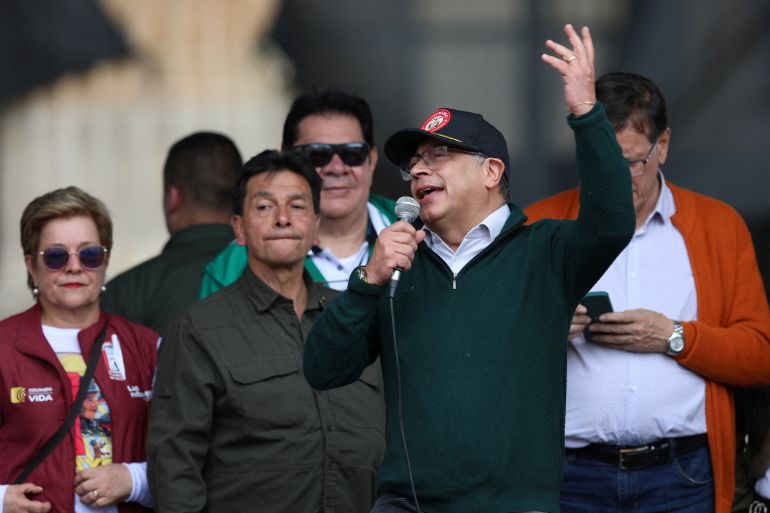
In a move that could reshape diplomatic relations in the Latin American region, Colombian President Gustavo Petro has signaled the country's potential decision to sever diplomatic ties with Israel over the escalating conflict in Gaza. Speaking to a crowd marking International Workers’ Day in Bogota on Wednesday, Petro emphasized that countries cannot be passive in the face of the crisis unfolding in Gaza. His announcement, made during a high-profile address, underscores a significant departure from Colombia's traditional foreign policy stance and reflects growing concerns over the humanitarian crisis in Gaza.
Colombian President Gustavo Petro, a staunch critic of Israel’s war in Gaza, says the Israeli government is ‘genocidal’.

A left-wing leader who came to power in 2022, Petro is considered part of a progressive wave known as the “pink tide” in Latin America. He has been one of the region’s most vocal critics of Israel since the start of the Gaza war.
In October, just days after the conflict began, Israel said it was “halting security exports” to Colombia after Petro accused Israeli Defence Minister Yoav Gallant of using language similar to what the “Nazis said of the Jews”. Gallant said the country was fighting “human animals” in Gaza, as he ordered a total siege of the territory following the deadly attacks on southern Israel on October 7.
A month later, Petro accused Israel of committing “genocide” in the besieged Palestinian enclave, drawing more ire from Israeli officials and pro-Israel advocacy groups.
In early April, the Colombian government requested to join a case at the International Court of Justice (ICJ) accusing Israel of genocide.
The UN’s top court ruled in January that Palestinians faced a plausible risk of genocide in Gaza and ordered Israel to prevent any such acts.
UN Special Rapporteur Francesca Albanese also said in late March that there were “reasonable grounds to believe that the threshold indicating the commission of … acts of genocide against Palestinians in Gaza has been met”.
“The overwhelming nature and scale of Israel’s assault on Gaza and the destructive conditions of life it has inflicted reveal an intent to physically destroy Palestinians as a group,” Albanese said in a report.
Israel has denied accusations of genocide, calling Albanese’s report an “obscene inversion of reality”.
The ongoing conflict between Israel and Palestine has intensified in recent months, marked by airstrikes, rocket attacks, and civilian casualties, drawing widespread condemnation from the international community. President Petro's remarks signal a willingness to take a decisive stance on the issue, amplifying Colombia's voice in the global call for peace and justice in the Middle East.

Colombia, historically maintaining diplomatic ties with Israel, now stands at a crossroads as President Petro navigates the complexities of balancing diplomatic considerations with moral imperatives. The potential severance of diplomatic ties between Colombia and Israel raises questions about the future of bilateral relations and the broader implications for regional geopolitics.
As Colombia evaluates its options, the international community closely watches developments, anticipating the repercussions of such a significant diplomatic move. President Petro's announcement injects new dynamics into an already volatile situation, adding another layer of complexity to the intricate web of international relations.
The situation continues to evolve rapidly, with stakeholders on all sides monitoring developments closely. President Petro's stance underscores Colombia's commitment to promoting peace and justice on the global stage, even in the face of challenging geopolitical circumstances. As the world waits for Colombia's final decision, the Gaza conflict remains a poignant reminder of the urgent need for peaceful resolution and lasting stability in the region.















